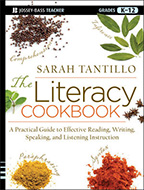Oral Fluency in Early Grades
 Want to know how you can improve your students' oral fluency without spending any money? Here are some tips (esp. for early grades):
Want to know how you can improve your students' oral fluency without spending any money? Here are some tips (esp. for early grades):
- Students MUST respond with complete sentences AT ALL TIMES. Train them to restate the question as part of their answer to build fluency. In some cases, you may need to scaffold the response with a stem, modeling how to start the response. This is particularly helpful for ELL students.
- Give students opportunities to think and pair-share. They need to practice talking for a purpose. Establish clear expectations about pair-sharing (level of volume, length of time): e.g., “Whisper to your partner what you think will happen to the main character and why. You have 20 seconds.”
- Encourage CHORAL pronunciation of vocabulary words and concepts you want to reinforce. If one student cannot pronounce a word, chances are others in the room also need help with it. Rather than calling out an individual student, make the whole class pronounce the word. And when reading a story aloud, you could say, “Repeat this part after me…” and get the whole class to act as the Greek chorus to add drama to the reading. Select key phrases that you repeat for a purpose. Then make reference to those phrases: e.g., “Remember that line we all said? What did we learn about the main character or protagonist from that line? What could we infer about him?”
- Give students LISTENING practice, as well, to reinforce listening and the comprehension skill of paraphrasing: one partner listens to what the other partner says, then has to rephrase it in his/her own words.
- In a similar vein, maintain high expectations for listening during whole-class discussions. Call on a student to rephrase what a peer just said. Ask another student, “Do you agree with what So and So just said? Why or why not?”
- Develop chants to reinforce grammar concepts or anything else you want students to remember.
- Use redundant vocabulary to boost inference and increase students’ interest in language: “Stop, halt cease, desist!” or, “I am going to recount a story today” or “Can someone help me distribute or disseminate the workbooks?” or “I adore the way you articulated your idea so completely, giving so much evidence to support your argument.”
For more information on conducting effective class discussions, see Chapter 4 on speaking and listening in The Literacy Cookbook, which is available HERE.

